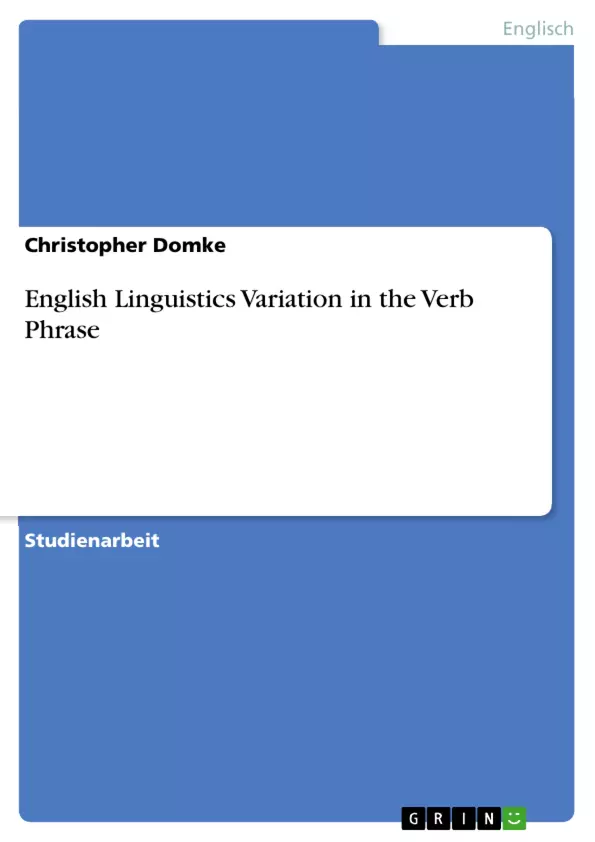In the following term paper I will briefly outline the development of the Simple Past and the Present Perfect throughout the years and then I will shortly summarize the modern use of these two tenses of both speakers of British and American English.
In Present-Day English, references to the past can be expressed either by the Present Perfect or the Simple Past and for each tense there are specific temporal adverbials. Some of them as yesterday, ago and last grammatically call for the Simple Past, while other temporal adverbials such as since and yet require the use of the Present Perfect. Recent corpus-based studies of Present-Day English have shown that the Present Perfect is more often used in British English than in American English.
Inhaltsverzeichnis
- 1. Introduction
- 2. Development of the Present Perfect vs. the Simple Past
- 3. Present Perfect vs. Simple Past - A Questionnaire.
- 4. Conclusion
- 5. References.
Zielsetzung und Themenschwerpunkte
Die vorliegende Arbeit befasst sich mit der Verwendung des Present Perfect und des Simple Past im modernen Englisch, insbesondere im Hinblick auf die Unterschiede zwischen britischem und amerikanischem Englisch. Die Arbeit untersucht die historische Entwicklung dieser Zeitformen und analysiert die aktuelle Verwendung anhand eines Fragebogens, der Einblicke in die sprachliche Praxis von Muttersprachlern gibt.
- Die Entwicklung des Present Perfect und Simple Past im Laufe der Zeit
- Die Verwendung des Present Perfect und Simple Past in britischem und amerikanischem Englisch
- Die Rolle von Zeitadverbialen bei der Wahl der Zeitform
- Die Ergebnisse eines Fragebogens zur Verwendung des Present Perfect und Simple Past in alltäglichen Situationen
- Die Frage, ob es Unterschiede in der Verwendung der Zeitformen zwischen verschiedenen Altersgruppen gibt
Zusammenfassung der Kapitel
1. Introduction
Die Einleitung führt in das Thema ein und beschreibt die aktuelle Verwendung des Present Perfect und Simple Past im modernen Englisch. Es wird hervorgehoben, dass das Present Perfect im Britischen Englisch häufiger verwendet wird als im Amerikanischen Englisch. Die Arbeit befasst sich mit der historischen Entwicklung der beiden Zeitformen und betrachtet verschiedene Forschungsarbeiten zum Thema.
2. Development of the Present Perfect vs. the Simple Past
Dieses Kapitel beleuchtet die Entwicklung des Present Perfect und Simple Past im Laufe der Geschichte. Es wird festgestellt, dass die Verwendung des Present Perfect seit dem 19. Jahrhundert zurückgegangen ist, während die Verwendung des Simple Past ebenfalls abgenommen hat. Es wird argumentiert, dass die Unterschiede in der Verwendung der Zeitformen zwischen britischem und amerikanischem Englisch eher auf regionale Unterschiede zurückzuführen sind als auf eine diachronische Veränderung.
3. Present Perfect vs. Simple Past - A Questionnaire.
Dieses Kapitel beschreibt die Durchführung eines Fragebogens, der Einblicke in die praktische Verwendung des Present Perfect und Simple Past in alltäglichen Situationen liefert. Der Fragebogen untersucht, wie Muttersprachler des Britischen und Amerikanischen Englisch in bestimmten Situationen reagieren würden. Die Ergebnisse des Fragebogens sollen aufzeigen, ob es Unterschiede in der Verwendung der Zeitformen zwischen verschiedenen Altersgruppen gibt.
Schlüsselwörter
Present Perfect, Simple Past, Zeitadverbial, Britisches Englisch, Amerikanisches Englisch, Sprachentwicklung, Sprachvariation, Fragebogen, Sprachliche Praxis
Häufig gestellte Fragen zu Present Perfect vs. Simple Past
Was ist der Hauptunterschied zwischen britischem und amerikanischem Englisch bei diesen Zeitformen?
Studien zeigen, dass das Present Perfect im britischen Englisch deutlich häufiger verwendet wird als im amerikanischen Englisch.
Welche Zeitadverbien verlangen das Simple Past?
Adverbien wie „yesterday“, „ago“ und „last“ signalisieren im Englischen grammatikalisch die Verwendung des Simple Past.
Wann muss das Present Perfect verwendet werden?
Zeitadverbien wie „since“ und „yet“ erfordern in der Regel die Verwendung des Present Perfect.
Wie hat sich die Verwendung dieser Zeiten historisch entwickelt?
Die Arbeit beschreibt, dass die Verwendung des Present Perfect seit dem 19. Jahrhundert insgesamt zurückgegangen ist, wobei regionale Unterschiede dominieren.
Was war das Ziel des Fragebogens in dieser Arbeit?
Der Fragebogen untersuchte die tatsächliche sprachliche Praxis von Muttersprachlern in Alltagssituationen und analysierte Unterschiede zwischen Altersgruppen.
- Citation du texte
- Christopher Domke (Auteur), 2013, English Linguistics Variation in the Verb Phrase, Munich, GRIN Verlag, https://www.grin.com/document/429733



